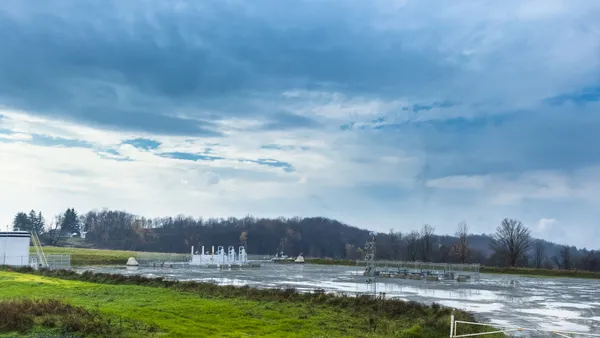Dive Brief:
- The Federal Energy Regulatory Commission on Friday rejected a Southwest Power Pool plan to standardize a pathway for transmission owners to build and profit from network upgrades needed to bring generators online.
- The self-funding proposal would create uncertainty for interconnection customers, possibly leading to canceled generating projects, FERC said in its 3-1 decision, agreeing with clean energy advocates.
- Utility self-funding can increase a generator’s interconnection cost by 30% to 50%, according to Gabe Tabak, senior counsel for the American Clean Power Association, which opposed SPP’s proposal. “Thankfully, FERC has been paying attention to the extraordinary harm that these cost increases can cause – and the impropriety of allowing a transmission owner to receive a ~10% rate of return where generators are fully funding upgrades anyway,” he said Friday on Twitter.
Dive Insight:
Utilities and other transmission owners in SPP are allowed to self-fund network upgrades, but there are no rules on how they can do that, the grid operator said in a Sept. 30 application at FERC.
SPP, which runs the grid from New Mexico to North Dakota, asked FERC to approve a proposal to create rules around transmission owners’ ability to self-fund network upgrades and to recover those costs — plus a return on the investment — from the interconnection customer.
American Clean Power Association, or ACP, Advanced Power Alliance, the Solar Energy Industries Association, or SEIA, the Natural Resources Defense Council and the Sustainable FERC Project opposed the proposal.
The groups said the proposal was unjust and unreasonable partly because self-funding would be more costly to generation developers than if the developers pay for it themselves, with no corresponding benefit.
Under the proposal, a transmission owner could indicate early in the interconnection study process that it will not elect to fund network upgrades identified at that point only to reverse course at the end of the process, FERC said.
The proposed process could lead to an interconnection customer to spend time and money on the study process after a transmission owner says it won’t pay for upgrades only to learn in the generation interconnection agreement negotiation phase that its project will no longer be economic due to increases in network upgrade costs because the transmission owner made a late-stage decision to fund the upgrades, FERC said.
“We are persuaded by Clean Energy Advocates’ argument that such circumstances could lead to late-stage withdrawals and attendant delays in administering the generator interconnection queue, further undermining the goals of Order No. 2003,” FERC said.
FERC rejected arguments by SPP and Southwestern Public Service, an Xcel Energy utility, that the proposal is similar to one FERC approved for the Midcontinent Independent System Operator. MISO’s process requires transmission owners to make binding self-funding decisions before generation interconnection agreement negotiations start, according to FERC.
FERC Commissioner James Danly dissented from the decision, saying SPP’s proposal gives interconnection customers more information than they get now and should have been approved.
Under SPP’s existing process, transmission owners can wait until the generation interconnection agreement process before indicating whether they will self-fund network upgrades, according to Danly.
“An advance non-binding indication is actually superior to the existing tariff because it provides more information to interconnection customers earlier in the process and does not, contrary to the position of the majority, create uncertainty warranting rejection,” he said.
Clean energy advocates see things differently.
The proposal would create uncertainty, according to SEIA. FERC’s rejection of SPP’s proposal will improve certainty in the SPP interconnection process by preventing transmission owners from imposing unnecessary late-stage network upgrade financing costs on developers, Melissa Alfano, SEIA director of energy markets and counsel, said Monday in a statement.
FERC is holding hearings on a PJM Interconnection proposal, ACP’s Tabak said, and in recent years has rejected self-funding proposals in New York and in MISO.
Also, in December, the U.S. Court of Appeals for the District of Columbia Circuit remanded to FERC orders allowing self-funding for generation upgrades in MISO, he said.
“We're at a point where clogged interconnection queues — and the high cost of upgrades — are being recognized as major impediments to the clean energy transition,” Tabak said, pointing to a just-released report from the Lawrence Berkeley National Laboratory.















